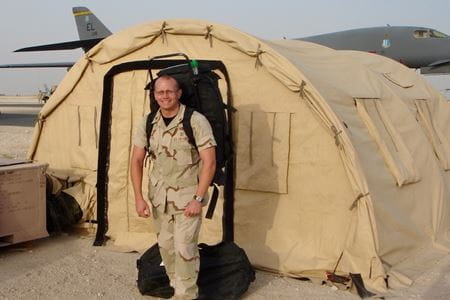When E. Matthew Ritter, MD, MHPE, joined the faculty at the Indiana University School of Medicine in September 2020, it was his first civilian job after 30 years in the U.S. Air Force. Ritter, a colonel, was a professor of surgery at the Uniformed Services University (USU) and Walter Reed National Military Medical Center, and program director of the General Surgery Residency at the National Capital Consortium in Bethesda, Maryland.
“I had to learn to trust people whose hair touched their ears,” he joked of civilian life.
Now Ritter is a professor of surgery at IU School of Medicine, where he directs the General Surgery Residency and is co-director of the American College of Surgeons Education Fellowship Program. He also leads the surgery department’s Surgical Skills Center, which is equipped with modern simulation tools to aid all surgical learners, from novices to surgeons in practice.
During his military career, Ritter directly trained over 100 military general surgery residents and assisted in training more than 2,000 military medical students. He has a slew of awards and honors for surgical education and research.
“My former residents include the chair of the USU/Walter Reed Department of Surgery, the General Surgery Residency program director, and the program director of the Surgical Education and Simulation Fellowship,” Ritter said. “The impact they, and those they train, will have is far greater than anything I could ever do individually.”
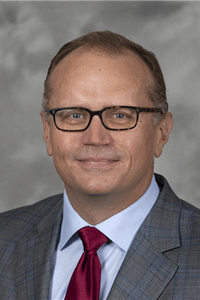 The path from military academy to a career in surgical education was something Ritter’s 18-year-old self never imagined.
The path from military academy to a career in surgical education was something Ritter’s 18-year-old self never imagined.
“If you asked me the day I graduated from high school if I would be a retired colonel after 30 years of military service, I would’ve laughed at you,” Ritter said.
As the son of West Virginia schoolteachers, his search for scholarships led him to look at military academies. His initial thought was to become a scientist. He never anticipated three overseas deployments to Afghanistan and Iraq or the countless trauma surgeries he would perform.
“I got the offer to go to the Air Force Academy two weeks after I graduated; I had to make my decision by Monday, and I was on a plane to basic training by Wednesday,” Ritter said. “That’s how fast your life can change.”
Although Ritter said, “I didn’t know what I was getting into” when choosing to pursue military medicine, he wouldn’t change anything about his professional pathway.
“There are a lot of really unique opportunities in the military that provide a lot of personal growth,” he said.
While military life meant adhering to a rigid structure, Ritter enjoyed training in adrenaline-inducing activities like freefall parachuting. At the Air Force Academy, he realized basic science wasn’t his forte, so he successfully applied for medical training. Surgery drew his interest as a field that’s challenging, exciting and rewarding.
‘Just take care of them.’
When Ritter joined the military, the United States hadn’t been involved in a major military conflict since the Vietnam War.
And then came 9/11.
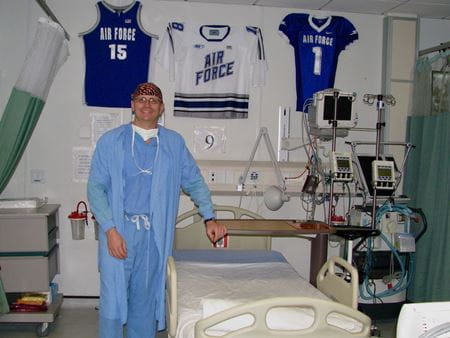 The Sept. 11, 2001, terrorist attacks and the resulting Global War on Terrorism came as a huge shock during Ritter’s time as chief resident at the David Grant Medical Center/University of California, Davis School of Medicine.
The Sept. 11, 2001, terrorist attacks and the resulting Global War on Terrorism came as a huge shock during Ritter’s time as chief resident at the David Grant Medical Center/University of California, Davis School of Medicine.
“That changed the whole trajectory of my miliary career,” Ritter said. “Half the faculty in my residency were gone in a matter of a couple weeks on deployment.”
Ritter was deployed to the combat zone in 2007, 2009 and 2011.
“Think of the worst trauma patient you get in a year (at a civilian hospital), and we see three of those every day,” Ritter said. “It’s easy to get in a bad place in your head. You’re seeing a lot of difficult stuff.”
To maintain his mental health, Ritter found a quiet place to “focus on the positives.” He focused on taking good care of wounded warriors and heroes — some of whom would receive the Purple Heart or Medal of Honor — doing his best to ensure they returned to their families back home.
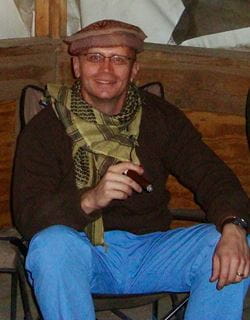 “I found the Hindu Kush Mountains pretty when the sun was coming up,” he said. “I would grab a cup of coffee and go on the roof of the hospital. It’s the most beautiful sunrise of anywhere I’ve been with mountains.”
“I found the Hindu Kush Mountains pretty when the sun was coming up,” he said. “I would grab a cup of coffee and go on the roof of the hospital. It’s the most beautiful sunrise of anywhere I’ve been with mountains.”
In a war, defining who the “enemy” is can be complex, Ritter said. In the end, he decided labels like “Taliban” didn’t matter when a patient needed surgery: “It’s an injured human being in front of you — just treat them.”
That lesson transfers to the civilian world when prison inmates come for needed surgeries.
“Don’t worry about what they are, or what they used to be,” Ritter said. “You can take care of them as a human being and have a positive impact on their life, and maybe, help change their pathway.”
‘Keep yourself ready for opportunities.’
When Ritter was a senior medical resident, minimally invasive surgery was just emerging. His career path came into focus after attending a conference of the Society of American Gastrointestinal and Endoscopic Surgeons (SAGES), where he was mesmerized by a video session of an expertly performed laparoscopic surgery.
“I just remember thinking, ‘I want to do that,’” Ritter said. “That’s when I really got the academic surgery bug.”
Today, Ritter serves on the SAGES Board of Governors and was founding chair of the society’s Education Council.
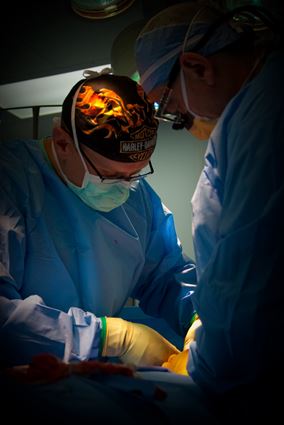 After his residency, Ritter completed a fellowship in advanced minimally invasive gastrointestinal and hernia surgery at Emory University in Atlanta and later earned a master’s in health professions education from the University of Illinois Chicago.
After his residency, Ritter completed a fellowship in advanced minimally invasive gastrointestinal and hernia surgery at Emory University in Atlanta and later earned a master’s in health professions education from the University of Illinois Chicago.
In 2017, Ritter received USU’s inaugural Teaching with Technology Award. He holds several noteworthy military decorations, including the Defense Superior Service Medal and the Meritorious Service Medal.
Ritter’s extensive published research includes advancements in simulation technology and laparoscopy techniques, and he is co-inventor of the Endoscopy Training System (ETS).
Upon his retirement from the military, Ritter sought an academic environment recognized for its excellence in surgical education. He knew many of his current IU colleagues from serving together on national organization committees.
Along with his role in surgical education at the IU School of Medicine, he was recruited by IU Health to help build a comprehensive hernia repair program, springing from his military experience in abdominal wall reconstruction.
Living in Indiana has been an adjustment. “It’s the only time in my adult life that I’ve lived somewhere I can’t see mountains,” he said.
Outside of work, Ritter enjoys spending time with his family, any chance to go snow skiing in Colorado, and “normal military things like motorcycles and sports and smoking cigars.”
His professional journey has been full of surprising — and rewarding — twists. If he could speak to his high school self, his advice would be: “Don’t get too wound up in planning your life because it’s not going to go that way anyway.”
“If you keep working hard, doing something enjoyable and interesting, new opportunities will open up,” he said. “Just keep yourself in a position to be ready.”
